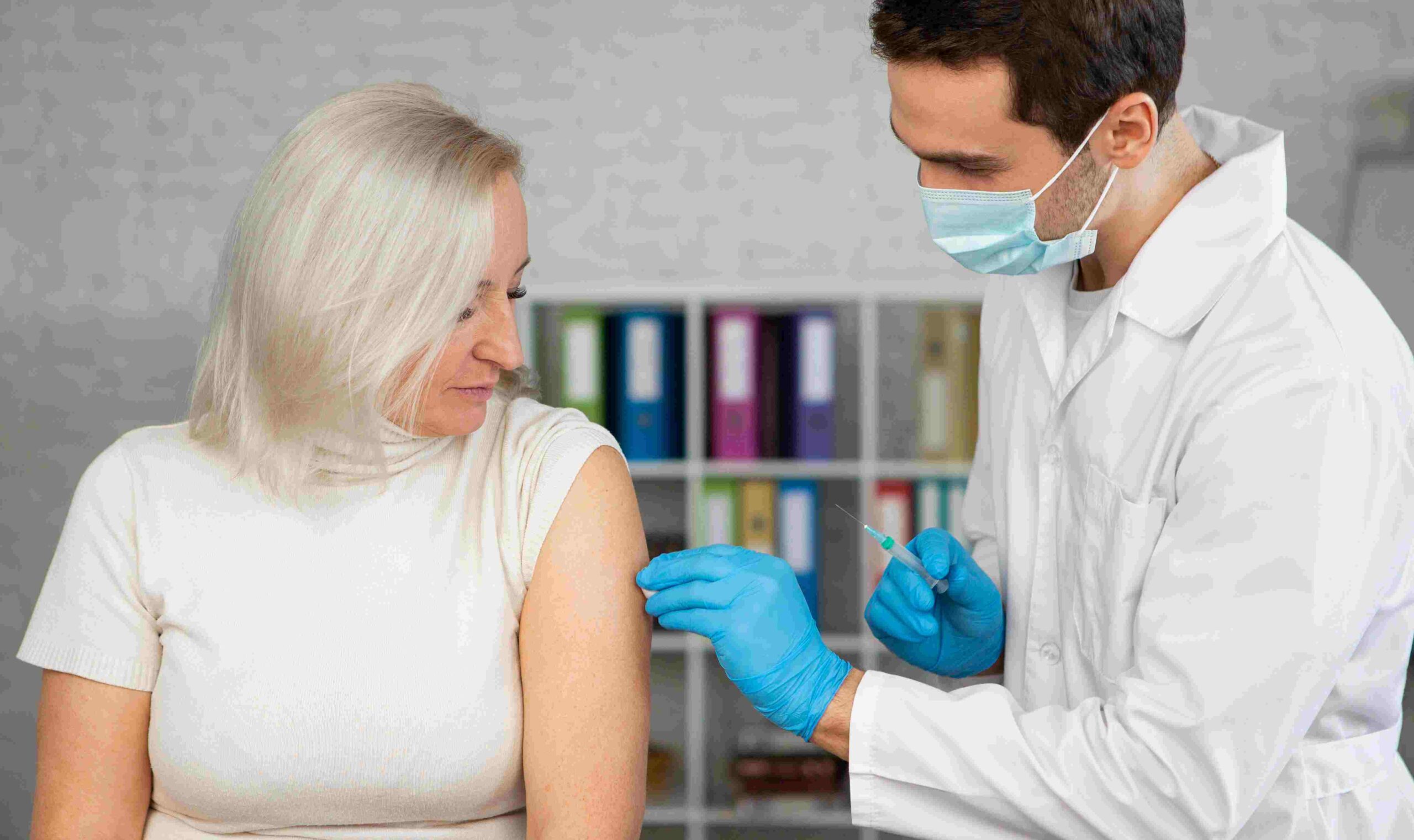Vaccination is one of the most effective tools in preventing the spread of infectious diseases. Among the many vaccines available today, the MMR vaccine holds significant importance due to its role in protecting against measles, mumps, and rubella — three potentially serious illnesses.
In this blog, we’ll explore what the MMR vaccine is, how it works, who needs it, its benefits, side effects, and common concerns.
What Is the MMR Vaccine?
The MMR vaccine is a combination vaccine that offers protection against measles, mumps, and rubella. These are three distinct viral infections, but they are grouped together in a single shot for convenience and effectiveness.
This vaccine contains live, attenuated (weakened) viruses that stimulate the immune system to build defense mechanisms without causing the actual diseases.
Let’s break down what each of these illnesses entails:
1. Measles
A highly contagious viral illness marked by fever, cough, runny nose, red eyes, and a characteristic rash. Measles can lead to serious complications such as pneumonia, encephalitis (brain inflammation), and even death, especially in young children.
2. Mumps
Mumps causes swelling in the salivary glands, resulting in puffy cheeks and a tender jaw. Other symptoms include fever, headache, and muscle aches. Complications can include hearing loss, meningitis, and in males, swelling of the testicles that may affect fertility.
3. Rubella (German Measles)
Rubella is typically mild but poses a significant threat during pregnancy. If a pregnant woman contracts rubella, it can cause congenital rubella syndrome (CRS), leading to birth defects such as deafness, heart issues, and developmental delays.
Why Is the MMR Vaccine Important?
The MMR vaccine has drastically reduced the incidence of these three diseases worldwide. Before the vaccine’s introduction, measles alone caused millions of infections and thousands of deaths annually in the United States. Thanks to vaccination efforts, these diseases are now rare in countries with high immunization rates.
Vaccination not only protects the individual but also helps in creating herd immunity, reducing the overall spread and protecting those who cannot receive the vaccine due to medical reasons.
Who Should Get the MMR Vaccine?
The Centers for Disease Control and Prevention (CDC) and other health authorities recommend the MMR vaccine for:
- Children: Two doses are recommended — the first at 12–15 months, and the second at 4–6 years.
- Adults born after 1956: Those who have not had the diseases or been vaccinated should get at least one dose.
- Healthcare workers, college students, and international travelers: These groups are at higher risk and may require proof of immunity or additional doses.
Who Should NOT Get the MMR Vaccine?
While the MMR vaccine is safe for most people, there are some exceptions:
- Individuals with severe allergic reactions to neomycin or a previous MMR dose.
- Pregnant women (they should wait until after delivery).
- People with weakened immune systems due to illness or treatments like chemotherapy.
Always consult a healthcare provider if you’re uncertain about your eligibility for the vaccine.
How Is the MMR Vaccine Given?
The MMR vaccine is administered as an intramuscular injection, usually in the upper arm or thigh. In most cases, two doses are enough to provide lifelong protection.
If someone receives only one dose, they may still have partial protection, but two doses are highly recommended for maximum effectiveness.
Common Side Effects of the MMR Vaccine
Like any vaccine, the MMR vaccine can cause side effects. However, most are mild and temporary, including:
- Fever
- Mild rash
- Swelling of glands in the cheeks or neck
Less common side effects include:
- Joint pain or stiffness (more common in adults)
- Temporary low platelet count
Serious allergic reactions are extremely rare. It’s important to note that the benefits of vaccination far outweigh the minimal risks associated with these side effects.
Addressing Common Myths and Misconceptions
Myth 1: MMR Vaccine Causes Autism
This myth originated from a now-discredited study published in the late 1990s. Multiple large-scale studies since then have shown no link between the MMR vaccine and autism. Health organizations worldwide — including the CDC, WHO, and American Academy of Pediatrics — support the vaccine’s safety.
Myth 2: Natural Immunity Is Better
While natural infection can lead to immunity, it comes with a significant risk of serious complications. The MMR vaccine offers the same immunity without the danger of severe illness.
Myth 3: Measles, Mumps, and Rubella Are No Longer a Threat
These diseases may be rare in the U.S., but they still exist in other parts of the world. With international travel, imported cases can lead to outbreaks in communities with low vaccination rates.
What to Do After Getting the MMR Vaccine
After vaccination, most people can return to their normal activities immediately. Here are a few tips:
- Stay hydrated to help your body process the vaccine.
- Monitor for mild side effects like fever or rash.
- Use acetaminophen or ibuprofen (as advised by a doctor) if there’s discomfort.
- Report any severe reactions to a healthcare provider.
MMR Vaccine and COVID-19: Any Connection?
During the COVID-19 pandemic, some researchers explored whether the MMR vaccine could offer protection due to immune cross-reactivity. However, there is no conclusive evidence to suggest that the MMR vaccine prevents or reduces COVID-19 severity. It remains crucial for individuals to get vaccines as per recommended guidelines, including both MMR and COVID-19 vaccinations where applicable.
Boosters and Catch-Up Doses
If you’re unsure whether you or your child has received the MMR vaccine, your doctor can conduct a blood test to check for immunity. In many cases, a catch-up vaccination is recommended.
Adults who work in healthcare, education, or travel internationally may require additional protection. It’s always best to verify vaccination records and follow up with your doctor if anything is missing.
The Bottom Line
The MMR vaccine is a safe, effective, and essential tool in preventing three dangerous diseases: measles, mumps, and rubella. With just two doses, individuals can gain long-lasting immunity and contribute to the health of their communities.
Vaccination protects not just the person receiving the shot but also vulnerable populations — including infants, pregnant women, and people with compromised immune systems — who rely on herd immunity for protection.
At CureMeDoc, we aim to provide reliable, research-backed information to help you make informed health decisions. Vaccines like MMR are pillars of modern medicine, proven to save lives and prevent suffering. If you or your loved ones haven’t received the MMR vaccine, now is a great time to speak with a healthcare provider and ensure you’re protected.
FAQs
Q1: How long does the MMR vaccine last?
Ans: Two doses typically provide lifelong immunity for most people.
Q2: Can I get the MMR vaccine if I’m pregnant?
Ans: No, pregnant women should wait until after delivery.
Q3: Is it okay to receive the MMR vaccine as an adult?
Ans: Yes. Adults born after 1956 who haven’t been vaccinated or had the diseases should get at least one dose.
Q4: What if I lost my vaccination records?
Ans: Your doctor can perform a blood test to check for immunity or simply revaccinate if needed.
Sahil Sachdeva is the Founder of curemedoc.com and a Digital Marketing professional with years of experience. If you need help in Content writing and want to increase your website ranking, connect with him, as he has some premium websites where you can share blogs with DoFollow links and increase your website’s ranking on Google.





